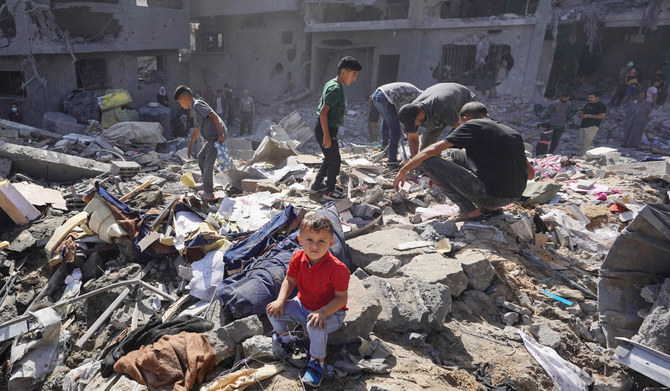GENEVA: The conflict in Gaza has created unprecedented soil, water, and air pollution in the region, destroying sanitation systems and leaving tonnes of debris from explosive devices, a UN report on the environmental impact of the war said on Tuesday.
The war between Israel and Hamas has swiftly reversed limited progress in improving the region’s water desalination and wastewater treatment facilities, restoring the Wadi Gaza coastal wetland, and investments in solar power installations, according to a preliminary assessment from the UN Environment Programme, or UNEP.
Explosive weapons have generated some 39 million tonnes of debris, the report said.
FASTFACT
UNEP is mandated to assist countries with pollution mitigation and control in areas affected by armed conflict or terrorism.
Each square meter of the Gaza Strip is now littered with more than 107 kg of debris. The report said that is more than five times the debris generated during the battle for Mosul, Iraq, in 2017.
“All of this is deeply harming people’s health, food security, and Gaza’s resilience,” said UNEP Executive Director Inger Andersen.
Gaza’s environment was already suffering from recurring conflicts, rapid urban growth, and high population density before the most recent conflict began on Oct. 7. The UN assessment adds to concerns about the unfolding humanitarian crisis and the environmental costs of war, with Ukraine also recording widespread ecological damage over the past two years.
“Understanding the environmental impacts of war is a grand challenge of our time,” said Eoghan Darbyshire, a senior researcher at the UK-based nonprofit Conflict and Environment Observatory.
“The impacts will not only be felt locally where the fighting is taking place but may be displaced or even felt at the global scale via greenhouse gas emissions.”
The UN assessment stems from a December 2023 request from the Palestinian Environment Quality Authority for UNEP to take stock of environmental damages. UNEP is mandated to assist countries with pollution mitigation and control in areas affected by armed conflict or terrorism.
Due to security concerns and access restrictions, the UN used remote sensing surveys, data from Palestinian technical entities, and damage assessments from the World Bank in their report.
Ground measurements, however, would be critical to understanding the extent of soil and water pollution, Darbyshire said.
The report found that the water, sanitation, and hygiene systems are almost entirely defunct, with Gaza’s five wastewater treatment plants shut down. Israel’s long-term occupation had already posed major environmental challenges in the Palestinian territories about water quality and availability, according to a 2020 report by the UN Development Program.
Over 92 percent of water in the Gaza Strip was then deemed unfit for human consumption.
The Gaza Strip had one of the highest densities of rooftop solar panels in the world, with the US-based Center for Strategic and International Studies estimating 2023 some 12,400 rooftop solar systems.
But Israel has since destroyed a large proportion of Gaza’s burgeoning solar infrastructure, and broken panels can leak lead and heavy metal contaminants into the soil.
Since a week-long truce in November, repeated attempts to arrange a ceasefire have failed.
Looking at the scale of environmental destruction, “it is my opinion that large areas of Gaza will not be recovered to a safe state within a generation, even with limitless finance and will,” said Darbyshire.


























